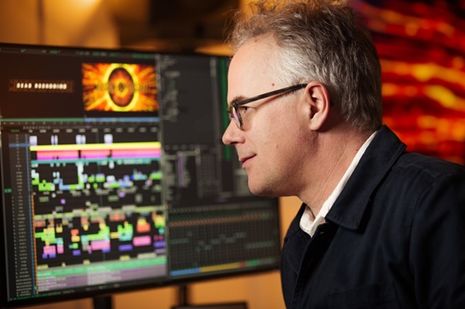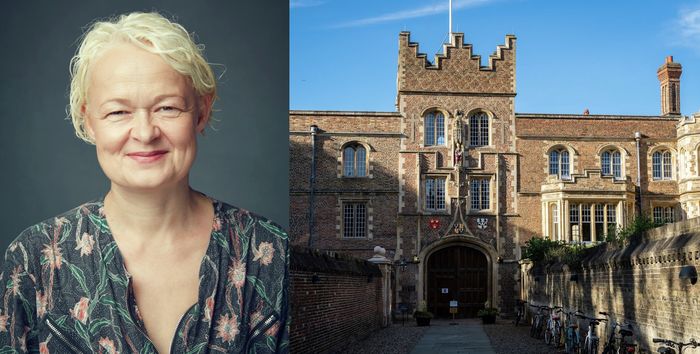Meet Eddie Hamilton, the award-winning editor behind Top Gun: Maverick and Mission: Impossible
Sophie Denny speaks to film editor Eddie Hamilton about finding his feet in the industry, the creative process and what AI means for the future of film

From being “obsessed with movies from about the age of eight” to editing blockbuster films, including Top Gun: Maverick and four Mission: Impossible films, Eddie Hamilton’s childhood dream of working in the film industry has become a reality.
It has taken Hamilton decades of hard work to get to where he is today – he didn’t get into film school, instead beginning by working as a runner at a post-production facility, but this did not hinder him. “Pretty much everyone has to start at the beginning and work their way up.” This is precisely what he did, and is his advice to anyone wanting to follow in his footsteps. You have to start out making the tea because: “Yes, you’ve been to Cambridge, but can you get your arse out of bed at 06.30 and be on a film set by 07.30 every day without fail? And can you be cheerful and happy and enthusiastic and smile?” It’s not all glitz and glamour from the get-go.
Hamilton initially wanted to be a writer or director before discovering that “the combination of storytelling and technology really appealed”, hence his becoming a film editor. This partnership between the creative and technical forms the crux of the job: you “hold the audience’s hand and take them on an emotional journey from beginning to end. And you have precious seconds to do that.”
“Top Gun: Maverick was the hardest thing I’ve ever done and will be the hardest thing I ever do”
In my naivety, I hadn’t realised how central emotions are, yet Hamilton insists: “It’s actually entirely creative and entirely emotional.” Watching a film is an emotional immersion; while we appreciate good editing and production, the feelings evoked are what stay with us. As such, for Hamilton: “The worst crime a filmmaker can make is not to engage somebody and entertain them.”
In practice, creating an engaging and entertaining film is not easy. Hamilton explains that part of editing’s appeal is that it’s “a lot less stressful than being on a film set”. However, when the final decisions fall into your hands, I note that this seems quite an overwhelming task. “It can be quite stressful,” he admits.
Hamilton likens film editing to essay-writing – something we are perhaps more familiar with: “When you write an essay, for example, you start it and it’s just long and a bit of a mess. And it’s way over the word count and you don’t really have it all formulated, and then you slowly work at it and you revise it and you cut it down and you move things around. It’s like that.” It’s all about trusting “that eventually you will get to the end and it will be the best version that it can be.”
Maverick was initially way over the “word count”, with Hamilton compressing over 800 hours of footage into just two. “Top Gun: Maverick was the hardest thing I’ve ever done and will be the hardest thing I ever do,” he says, “like running 20 marathons back-to-back.” It was two intense years of 10-hour days with only one week off, but Hamilton caveats this by acknowledging: “That’s also what I worked 20 years in my career to get to.”
He’s cautious to admit whether he is proud of his achievements: “I feel proud, but pride comes before a fall, right? So I don’t take it for granted and I don’t assume that I will be offered any more jobs.” Citing a recent experience of seeing someone watching Maverick a couple of seats away from him on a train, Hamilton tells me that he does “enjoy that feeling”, before reinforcing the importance of constantly working to improve. This attitude has served him well.
“I love going to the cinema. It’s my church. It’s my favourite thing to do”
Getting to a place where you are editing a film that wins 93 awards and gains 217 nominations inevitably comes with great sacrifice. Hamilton admits that “the work-life balance is a real challenge,” as he spends months away from his wife and two daughters, but equally, taking your family to the Oscars is quite special. Perhaps just as exciting is Tom Cruise promising “to take [his daughters] skydiving when they’re both 18”.
It would be understandable if going to the cinema is the last thing Hamilton wants to do in his spare time, but he tells me otherwise: “I love going to the cinema. It’s my church. It’s my favourite thing to do.” After spending weeks agonising over just two minutes of a film, sitting back and watching something in full “gives you an energy boost … and reminds you of your passion for it”.
With Hamilton so invested professionally and personally in the film industry, I am keen to get his take on the impact of AI on the industry’s future, especially regarding the ongoing Hollywood strikes. The future is uncertain, but he strongly believes that AI cannot replace humans. While it may help some areas: “It doesn’t have a voice of its own,” therefore it will not be able to devise the original concepts needed to attract audiences.
Importantly, it lacks the emotional understanding that is the essence of human existence: “AI does not have children. It doesn’t have parents. It’s never kissed anybody. It’s never lost anybody. It’s never been chased down a street and run for its life. It’s never fallen in love. And all of those things are what makes us human.”
This return to the importance of emotion characterises Hamilton’s passion for film, and demonstrates that emotion really is fundamental when creating a cinematographic masterpiece.
 News / Right-wing billionaire Peter Thiel gives ‘antichrist’ lecture in Cambridge6 February 2026
News / Right-wing billionaire Peter Thiel gives ‘antichrist’ lecture in Cambridge6 February 2026 News / Cambridge students uncover possible execution pit9 February 2026
News / Cambridge students uncover possible execution pit9 February 2026 News / Epstein contacted Cambridge academics about research funding6 February 2026
News / Epstein contacted Cambridge academics about research funding6 February 2026 News / Man pleads guility to arson at Catz8 February 2026
News / Man pleads guility to arson at Catz8 February 2026 News / John’s duped into £10m overspend6 February 2026
News / John’s duped into £10m overspend6 February 2026









